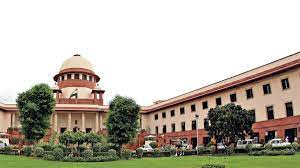The Writ Prayers, in effect, are directed against the respondents not to interfere with the lawful possession and enjoyment of the Writ Petitioner over an extent of acres 4.800 decimals in Plot No. 1288 under Khata 420, village Pathargadia (for short, ‘petition land’) and restrain the continuation of R.C. No. 1 of 2006 initiated by Tehsildar, Bhubaneswar/Appellant No.8 herein. The dispute, in fact, or the enforceable right claimed by the petitioner could be appreciated by taking note of the following admitted circumstances and also by considering the disputed facts. ( Para 3)
The Tehsildar, Bhubaneswar, in W.L. Case No. 1686 of 1979, on 07.05.1981, settled the petition land in favour of Surgeon Vice Admiral Ganesh Prasad Panda. The land was identified with the sketch. The consequence of the settlement, one can infer, is possession of settled land was made over to Surgeon Vice Admiral Ganesh Prasad Panda. (Para 4)
The Writ Petitioner claims to have bought the petition land under cultivation and, later on, converted the petition land into a farmhouse. The petitioner claimed actual enjoyment of the petition property. (Para 4.1)
On 20.03.2006, a Show Cause Notice under Section 3(B) of Orissa Government Land Settlement Act, 1962 was issued to IDCO proposing to resume petition land on the ground of alleged violation of conditions of the grant. (Para 6)
The above observation is necessary for, firstly, if we assume that the land alienated to IDCO is different or distinct, then, interference with possession of petition land is arbitrary and illegal. Secondly, if the extent viz. petition land and land settled in favour of IDCO, then, without dispossessing the petitioner(s), in the manner known to law, the settlement in favour of IDCO, by including petition land, is illegal and unconstitutional. (Para 12.1)
The law on the power of re-entry is fairly wellsettled. The re-entry without reference to the law, in the facts and circumstances of this case, has been rightly held in favour of the Writ Petitioners. (Para 12.2)
After perusing the Judgment, we consider that the High Court recorded a finding not by deciding a fact in issue on title, identity, or entitlement but from the record and admitted documents. (Para 12.2)
SUPREME COURT OF INDIA
2023 STPL(Web) 200 SC
[2023INSC753]
Chairman-Cum-Managing Director, Industrial Infrastructure Development Corporation Of Orissa Vs. Late Surgeon Vice Admiral Gp Panda Through His Legal Heirs And Others
Civil Appeal No. 5151 of 2023 (@ S.L.P.(C) No. 14949 of 2018) With Civil Appeal No. 5152 of 2023 (@ Slp (C) No. 20490 of 2018) With Civil Appeal No. 5153 of 2023 (@ Slp (C) No.17857 of 2023 @ D.No. 26693 of 2018)-Decided on 22-8-2023
https://stpllaw.in/wp-content/uploads/2023/08/2023-STPLWeb-200-SC.pdf







